Detailed Analysis of Australian Taxation Law Assignment, Semester 2
VerifiedAdded on 2020/03/04
|13
|2189
|45
Homework Assignment
AI Summary
This document presents a comprehensive solution to an Australian taxation law assignment. The solution addresses various scenarios, including frequent flier programs, compensation for damaged assets, gifts related to employment, and the tax implications of awards and reimbursements. It covers aspects like assessable income, deductions, and the application of relevant tax rulings, such as TR 1999/6 and TR 1999/10. The assignment also analyzes the tax treatment of self-education expenses, expenses related to performing assets, and travel expenses. Additionally, the solution examines the tax residency of an overseas student and the deductibility of work-related expenses, referencing relevant case law and legislation like ITAA 1997. The assignment demonstrates a strong understanding of Australian taxation principles and their practical application. The document also includes a detailed reference list of sources used in the preparation of the assignment.
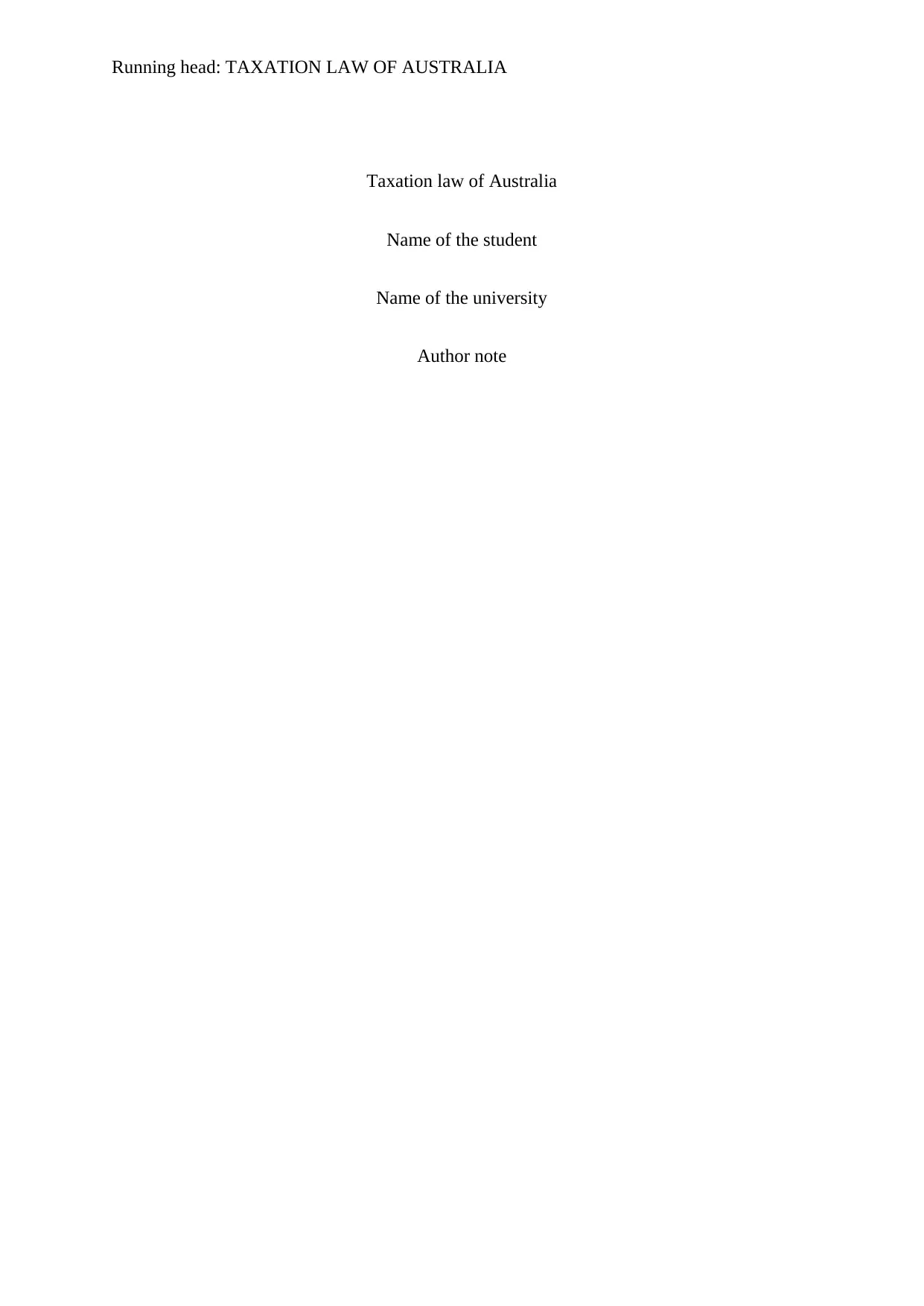
Running head: TAXATION LAW OF AUSTRALIA
Taxation law of Australia
Name of the student
Name of the university
Author note
Taxation law of Australia
Name of the student
Name of the university
Author note
Paraphrase This Document
Need a fresh take? Get an instant paraphrase of this document with our AI Paraphraser
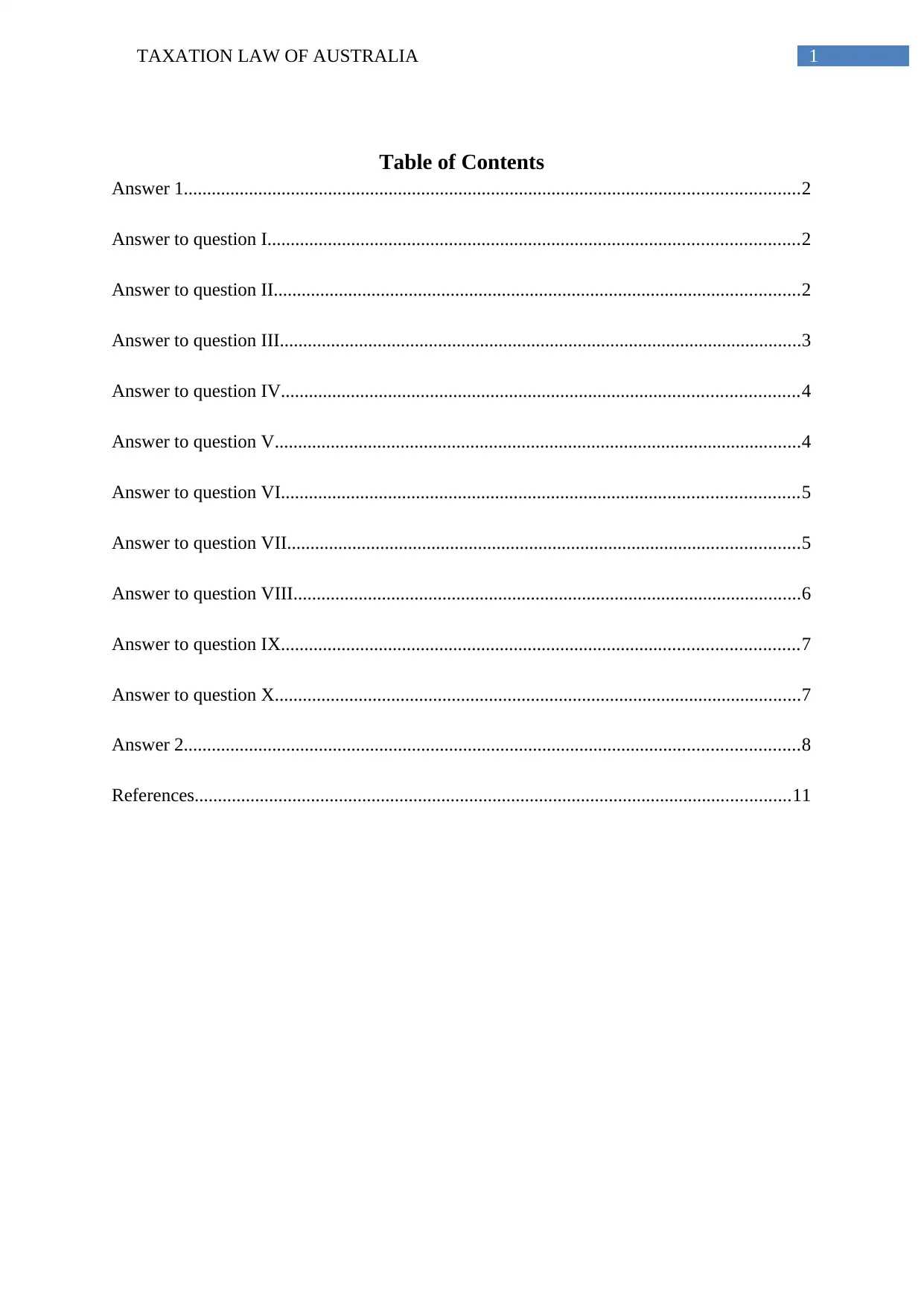
1TAXATION LAW OF AUSTRALIA
Table of Contents
Answer 1....................................................................................................................................2
Answer to question I..................................................................................................................2
Answer to question II.................................................................................................................2
Answer to question III................................................................................................................3
Answer to question IV...............................................................................................................4
Answer to question V.................................................................................................................4
Answer to question VI...............................................................................................................5
Answer to question VII..............................................................................................................5
Answer to question VIII.............................................................................................................6
Answer to question IX...............................................................................................................7
Answer to question X.................................................................................................................7
Answer 2....................................................................................................................................8
References................................................................................................................................11
Table of Contents
Answer 1....................................................................................................................................2
Answer to question I..................................................................................................................2
Answer to question II.................................................................................................................2
Answer to question III................................................................................................................3
Answer to question IV...............................................................................................................4
Answer to question V.................................................................................................................4
Answer to question VI...............................................................................................................5
Answer to question VII..............................................................................................................5
Answer to question VIII.............................................................................................................6
Answer to question IX...............................................................................................................7
Answer to question X.................................................................................................................7
Answer 2....................................................................................................................................8
References................................................................................................................................11
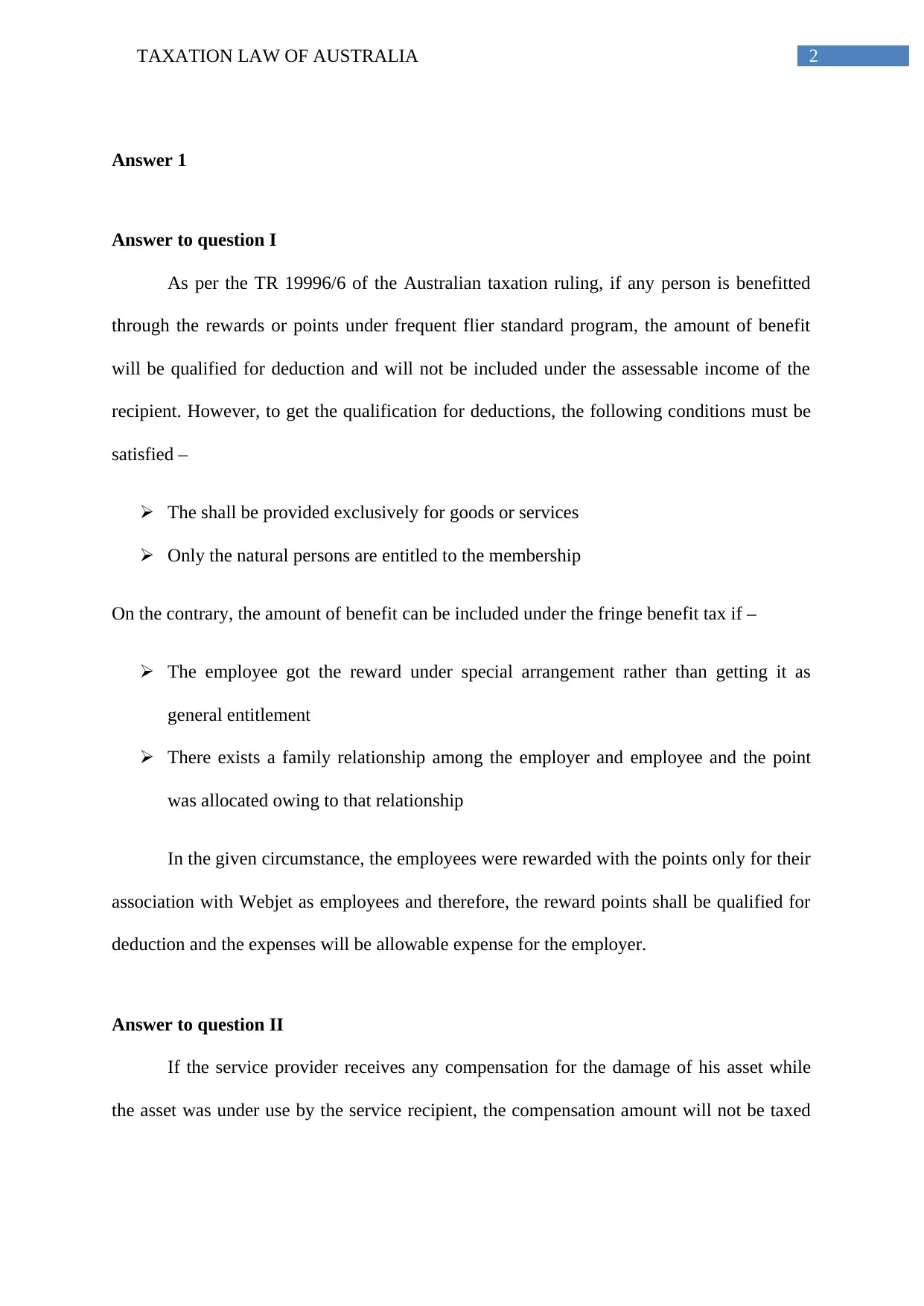
2TAXATION LAW OF AUSTRALIA
Answer 1
Answer to question I
As per the TR 19996/6 of the Australian taxation ruling, if any person is benefitted
through the rewards or points under frequent flier standard program, the amount of benefit
will be qualified for deduction and will not be included under the assessable income of the
recipient. However, to get the qualification for deductions, the following conditions must be
satisfied –
The shall be provided exclusively for goods or services
Only the natural persons are entitled to the membership
On the contrary, the amount of benefit can be included under the fringe benefit tax if –
The employee got the reward under special arrangement rather than getting it as
general entitlement
There exists a family relationship among the employer and employee and the point
was allocated owing to that relationship
In the given circumstance, the employees were rewarded with the points only for their
association with Webjet as employees and therefore, the reward points shall be qualified for
deduction and the expenses will be allowable expense for the employer.
Answer to question II
If the service provider receives any compensation for the damage of his asset while
the asset was under use by the service recipient, the compensation amount will not be taxed
Answer 1
Answer to question I
As per the TR 19996/6 of the Australian taxation ruling, if any person is benefitted
through the rewards or points under frequent flier standard program, the amount of benefit
will be qualified for deduction and will not be included under the assessable income of the
recipient. However, to get the qualification for deductions, the following conditions must be
satisfied –
The shall be provided exclusively for goods or services
Only the natural persons are entitled to the membership
On the contrary, the amount of benefit can be included under the fringe benefit tax if –
The employee got the reward under special arrangement rather than getting it as
general entitlement
There exists a family relationship among the employer and employee and the point
was allocated owing to that relationship
In the given circumstance, the employees were rewarded with the points only for their
association with Webjet as employees and therefore, the reward points shall be qualified for
deduction and the expenses will be allowable expense for the employer.
Answer to question II
If the service provider receives any compensation for the damage of his asset while
the asset was under use by the service recipient, the compensation amount will not be taxed
⊘ This is a preview!⊘
Do you want full access?
Subscribe today to unlock all pages.

Trusted by 1+ million students worldwide
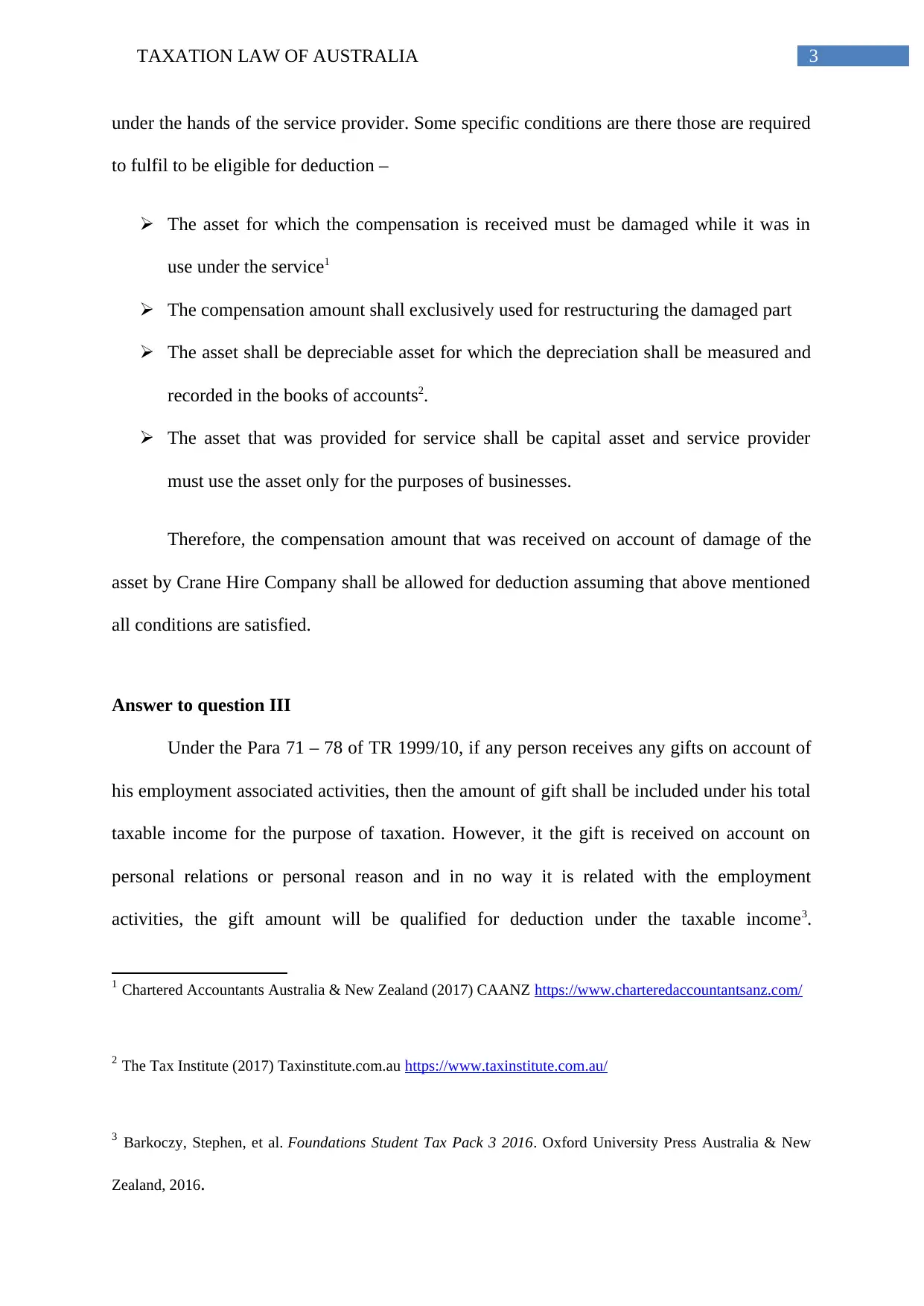
3TAXATION LAW OF AUSTRALIA
under the hands of the service provider. Some specific conditions are there those are required
to fulfil to be eligible for deduction –
The asset for which the compensation is received must be damaged while it was in
use under the service1
The compensation amount shall exclusively used for restructuring the damaged part
The asset shall be depreciable asset for which the depreciation shall be measured and
recorded in the books of accounts2.
The asset that was provided for service shall be capital asset and service provider
must use the asset only for the purposes of businesses.
Therefore, the compensation amount that was received on account of damage of the
asset by Crane Hire Company shall be allowed for deduction assuming that above mentioned
all conditions are satisfied.
Answer to question III
Under the Para 71 – 78 of TR 1999/10, if any person receives any gifts on account of
his employment associated activities, then the amount of gift shall be included under his total
taxable income for the purpose of taxation. However, it the gift is received on account on
personal relations or personal reason and in no way it is related with the employment
activities, the gift amount will be qualified for deduction under the taxable income3.
1 Chartered Accountants Australia & New Zealand (2017) CAANZ https://www.charteredaccountantsanz.com/
2 The Tax Institute (2017) Taxinstitute.com.au https://www.taxinstitute.com.au/
3 Barkoczy, Stephen, et al. Foundations Student Tax Pack 3 2016. Oxford University Press Australia & New
Zealand, 2016.
under the hands of the service provider. Some specific conditions are there those are required
to fulfil to be eligible for deduction –
The asset for which the compensation is received must be damaged while it was in
use under the service1
The compensation amount shall exclusively used for restructuring the damaged part
The asset shall be depreciable asset for which the depreciation shall be measured and
recorded in the books of accounts2.
The asset that was provided for service shall be capital asset and service provider
must use the asset only for the purposes of businesses.
Therefore, the compensation amount that was received on account of damage of the
asset by Crane Hire Company shall be allowed for deduction assuming that above mentioned
all conditions are satisfied.
Answer to question III
Under the Para 71 – 78 of TR 1999/10, if any person receives any gifts on account of
his employment associated activities, then the amount of gift shall be included under his total
taxable income for the purpose of taxation. However, it the gift is received on account on
personal relations or personal reason and in no way it is related with the employment
activities, the gift amount will be qualified for deduction under the taxable income3.
1 Chartered Accountants Australia & New Zealand (2017) CAANZ https://www.charteredaccountantsanz.com/
2 The Tax Institute (2017) Taxinstitute.com.au https://www.taxinstitute.com.au/
3 Barkoczy, Stephen, et al. Foundations Student Tax Pack 3 2016. Oxford University Press Australia & New
Zealand, 2016.
Paraphrase This Document
Need a fresh take? Get an instant paraphrase of this document with our AI Paraphraser
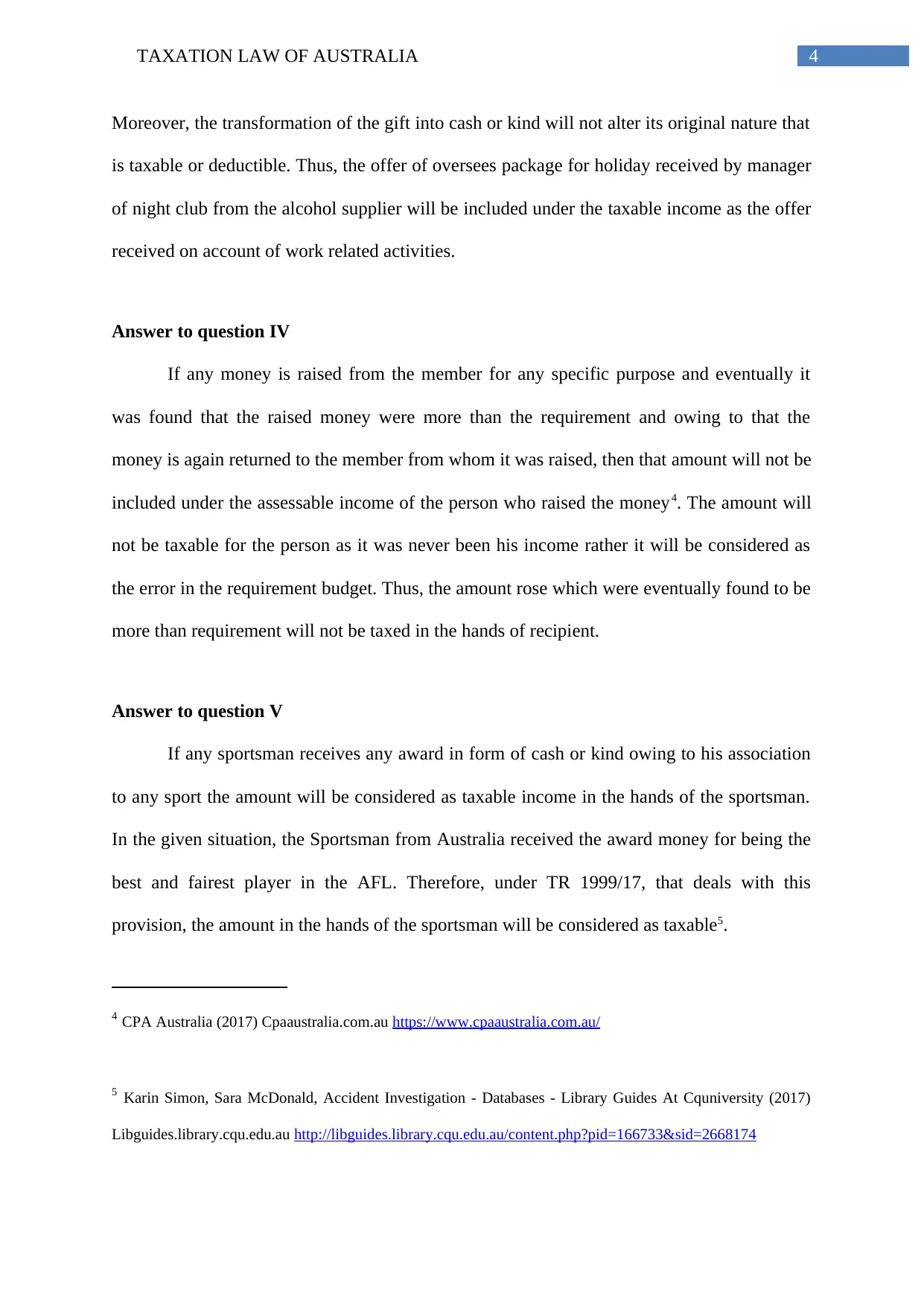
4TAXATION LAW OF AUSTRALIA
Moreover, the transformation of the gift into cash or kind will not alter its original nature that
is taxable or deductible. Thus, the offer of oversees package for holiday received by manager
of night club from the alcohol supplier will be included under the taxable income as the offer
received on account of work related activities.
Answer to question IV
If any money is raised from the member for any specific purpose and eventually it
was found that the raised money were more than the requirement and owing to that the
money is again returned to the member from whom it was raised, then that amount will not be
included under the assessable income of the person who raised the money4. The amount will
not be taxable for the person as it was never been his income rather it will be considered as
the error in the requirement budget. Thus, the amount rose which were eventually found to be
more than requirement will not be taxed in the hands of recipient.
Answer to question V
If any sportsman receives any award in form of cash or kind owing to his association
to any sport the amount will be considered as taxable income in the hands of the sportsman.
In the given situation, the Sportsman from Australia received the award money for being the
best and fairest player in the AFL. Therefore, under TR 1999/17, that deals with this
provision, the amount in the hands of the sportsman will be considered as taxable5.
4 CPA Australia (2017) Cpaaustralia.com.au https://www.cpaaustralia.com.au/
5 Karin Simon, Sara McDonald, Accident Investigation - Databases - Library Guides At Cquniversity (2017)
Libguides.library.cqu.edu.au http://libguides.library.cqu.edu.au/content.php?pid=166733&sid=2668174
Moreover, the transformation of the gift into cash or kind will not alter its original nature that
is taxable or deductible. Thus, the offer of oversees package for holiday received by manager
of night club from the alcohol supplier will be included under the taxable income as the offer
received on account of work related activities.
Answer to question IV
If any money is raised from the member for any specific purpose and eventually it
was found that the raised money were more than the requirement and owing to that the
money is again returned to the member from whom it was raised, then that amount will not be
included under the assessable income of the person who raised the money4. The amount will
not be taxable for the person as it was never been his income rather it will be considered as
the error in the requirement budget. Thus, the amount rose which were eventually found to be
more than requirement will not be taxed in the hands of recipient.
Answer to question V
If any sportsman receives any award in form of cash or kind owing to his association
to any sport the amount will be considered as taxable income in the hands of the sportsman.
In the given situation, the Sportsman from Australia received the award money for being the
best and fairest player in the AFL. Therefore, under TR 1999/17, that deals with this
provision, the amount in the hands of the sportsman will be considered as taxable5.
4 CPA Australia (2017) Cpaaustralia.com.au https://www.cpaaustralia.com.au/
5 Karin Simon, Sara McDonald, Accident Investigation - Databases - Library Guides At Cquniversity (2017)
Libguides.library.cqu.edu.au http://libguides.library.cqu.edu.au/content.php?pid=166733&sid=2668174
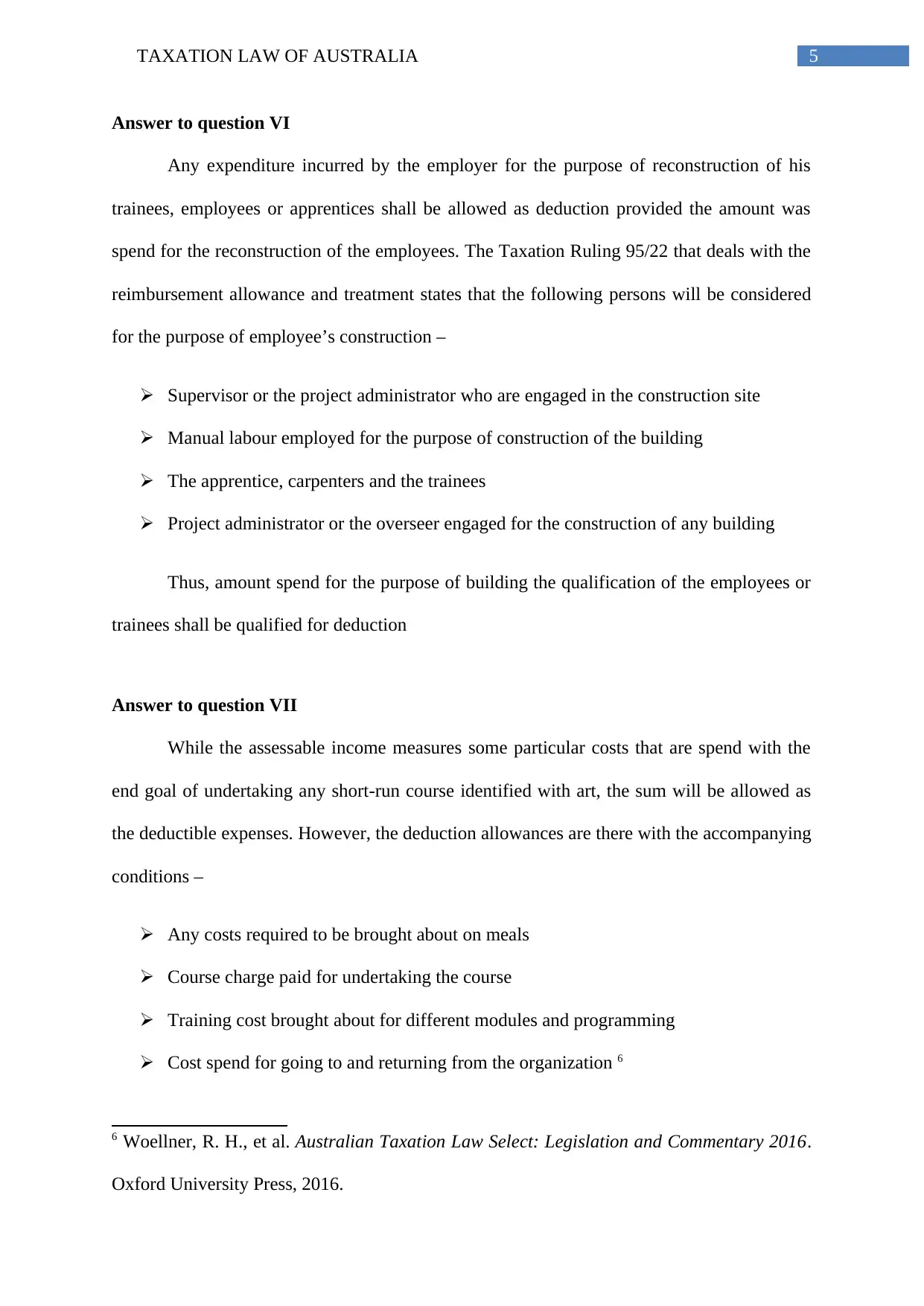
5TAXATION LAW OF AUSTRALIA
Answer to question VI
Any expenditure incurred by the employer for the purpose of reconstruction of his
trainees, employees or apprentices shall be allowed as deduction provided the amount was
spend for the reconstruction of the employees. The Taxation Ruling 95/22 that deals with the
reimbursement allowance and treatment states that the following persons will be considered
for the purpose of employee’s construction –
Supervisor or the project administrator who are engaged in the construction site
Manual labour employed for the purpose of construction of the building
The apprentice, carpenters and the trainees
Project administrator or the overseer engaged for the construction of any building
Thus, amount spend for the purpose of building the qualification of the employees or
trainees shall be qualified for deduction
Answer to question VII
While the assessable income measures some particular costs that are spend with the
end goal of undertaking any short-run course identified with art, the sum will be allowed as
the deductible expenses. However, the deduction allowances are there with the accompanying
conditions –
Any costs required to be brought about on meals
Course charge paid for undertaking the course
Training cost brought about for different modules and programming
Cost spend for going to and returning from the organization 6
6 Woellner, R. H., et al. Australian Taxation Law Select: Legislation and Commentary 2016.
Oxford University Press, 2016.
Answer to question VI
Any expenditure incurred by the employer for the purpose of reconstruction of his
trainees, employees or apprentices shall be allowed as deduction provided the amount was
spend for the reconstruction of the employees. The Taxation Ruling 95/22 that deals with the
reimbursement allowance and treatment states that the following persons will be considered
for the purpose of employee’s construction –
Supervisor or the project administrator who are engaged in the construction site
Manual labour employed for the purpose of construction of the building
The apprentice, carpenters and the trainees
Project administrator or the overseer engaged for the construction of any building
Thus, amount spend for the purpose of building the qualification of the employees or
trainees shall be qualified for deduction
Answer to question VII
While the assessable income measures some particular costs that are spend with the
end goal of undertaking any short-run course identified with art, the sum will be allowed as
the deductible expenses. However, the deduction allowances are there with the accompanying
conditions –
Any costs required to be brought about on meals
Course charge paid for undertaking the course
Training cost brought about for different modules and programming
Cost spend for going to and returning from the organization 6
6 Woellner, R. H., et al. Australian Taxation Law Select: Legislation and Commentary 2016.
Oxford University Press, 2016.
⊘ This is a preview!⊘
Do you want full access?
Subscribe today to unlock all pages.

Trusted by 1+ million students worldwide
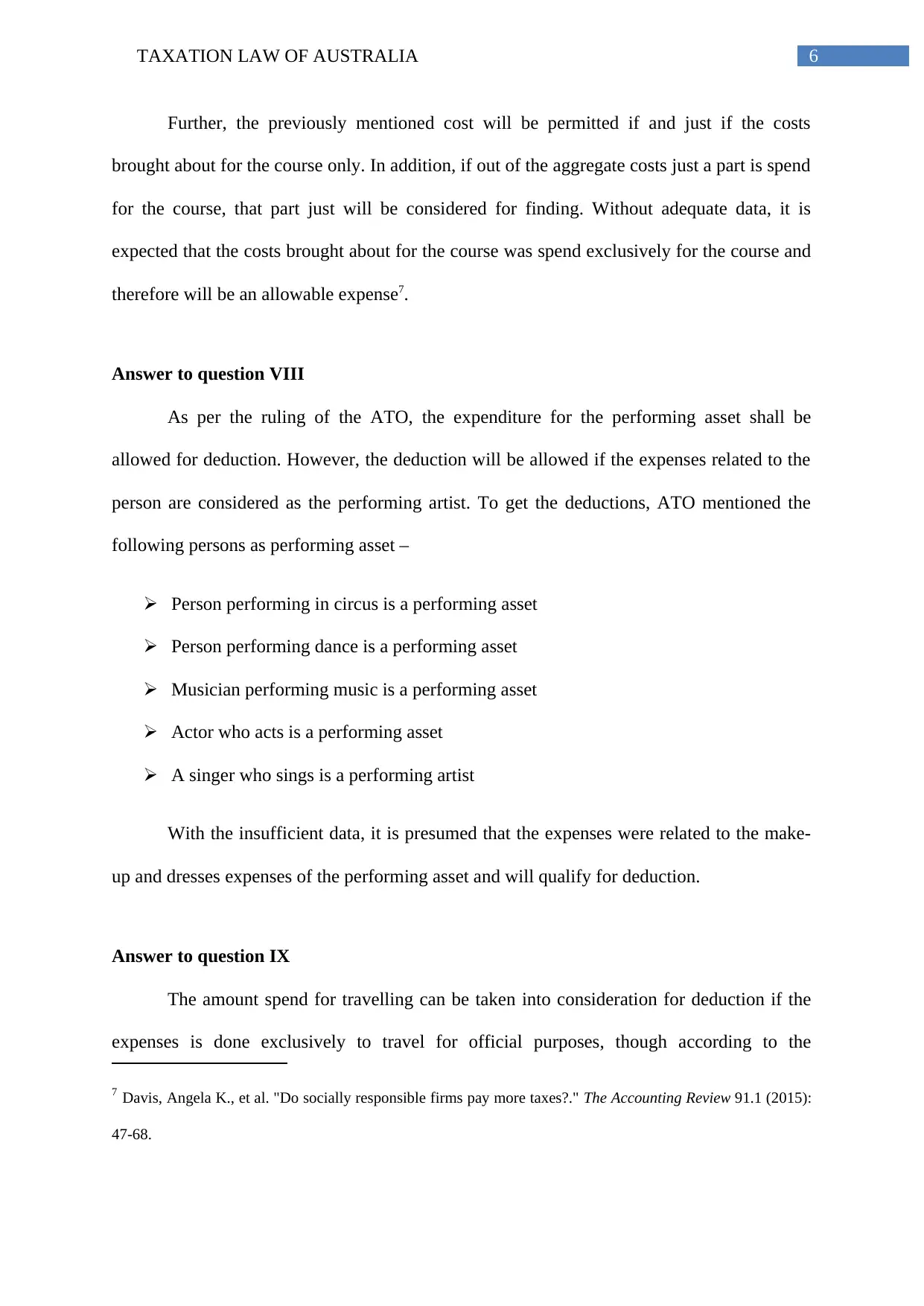
6TAXATION LAW OF AUSTRALIA
Further, the previously mentioned cost will be permitted if and just if the costs
brought about for the course only. In addition, if out of the aggregate costs just a part is spend
for the course, that part just will be considered for finding. Without adequate data, it is
expected that the costs brought about for the course was spend exclusively for the course and
therefore will be an allowable expense7.
Answer to question VIII
As per the ruling of the ATO, the expenditure for the performing asset shall be
allowed for deduction. However, the deduction will be allowed if the expenses related to the
person are considered as the performing artist. To get the deductions, ATO mentioned the
following persons as performing asset –
Person performing in circus is a performing asset
Person performing dance is a performing asset
Musician performing music is a performing asset
Actor who acts is a performing asset
A singer who sings is a performing artist
With the insufficient data, it is presumed that the expenses were related to the make-
up and dresses expenses of the performing asset and will qualify for deduction.
Answer to question IX
The amount spend for travelling can be taken into consideration for deduction if the
expenses is done exclusively to travel for official purposes, though according to the
7 Davis, Angela K., et al. "Do socially responsible firms pay more taxes?." The Accounting Review 91.1 (2015):
47-68.
Further, the previously mentioned cost will be permitted if and just if the costs
brought about for the course only. In addition, if out of the aggregate costs just a part is spend
for the course, that part just will be considered for finding. Without adequate data, it is
expected that the costs brought about for the course was spend exclusively for the course and
therefore will be an allowable expense7.
Answer to question VIII
As per the ruling of the ATO, the expenditure for the performing asset shall be
allowed for deduction. However, the deduction will be allowed if the expenses related to the
person are considered as the performing artist. To get the deductions, ATO mentioned the
following persons as performing asset –
Person performing in circus is a performing asset
Person performing dance is a performing asset
Musician performing music is a performing asset
Actor who acts is a performing asset
A singer who sings is a performing artist
With the insufficient data, it is presumed that the expenses were related to the make-
up and dresses expenses of the performing asset and will qualify for deduction.
Answer to question IX
The amount spend for travelling can be taken into consideration for deduction if the
expenses is done exclusively to travel for official purposes, though according to the
7 Davis, Angela K., et al. "Do socially responsible firms pay more taxes?." The Accounting Review 91.1 (2015):
47-68.
Paraphrase This Document
Need a fresh take? Get an instant paraphrase of this document with our AI Paraphraser
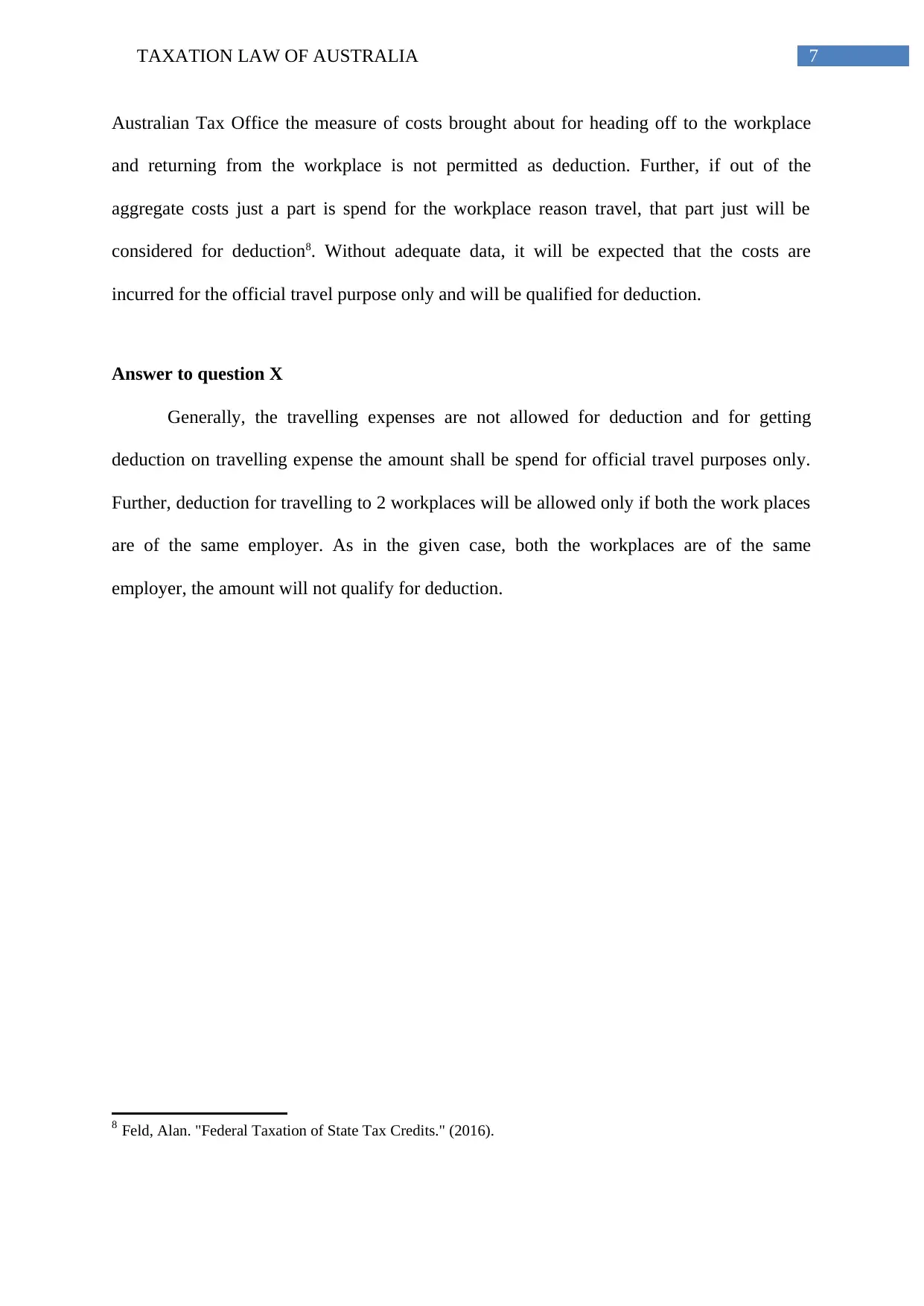
7TAXATION LAW OF AUSTRALIA
Australian Tax Office the measure of costs brought about for heading off to the workplace
and returning from the workplace is not permitted as deduction. Further, if out of the
aggregate costs just a part is spend for the workplace reason travel, that part just will be
considered for deduction8. Without adequate data, it will be expected that the costs are
incurred for the official travel purpose only and will be qualified for deduction.
Answer to question X
Generally, the travelling expenses are not allowed for deduction and for getting
deduction on travelling expense the amount shall be spend for official travel purposes only.
Further, deduction for travelling to 2 workplaces will be allowed only if both the work places
are of the same employer. As in the given case, both the workplaces are of the same
employer, the amount will not qualify for deduction.
8 Feld, Alan. "Federal Taxation of State Tax Credits." (2016).
Australian Tax Office the measure of costs brought about for heading off to the workplace
and returning from the workplace is not permitted as deduction. Further, if out of the
aggregate costs just a part is spend for the workplace reason travel, that part just will be
considered for deduction8. Without adequate data, it will be expected that the costs are
incurred for the official travel purpose only and will be qualified for deduction.
Answer to question X
Generally, the travelling expenses are not allowed for deduction and for getting
deduction on travelling expense the amount shall be spend for official travel purposes only.
Further, deduction for travelling to 2 workplaces will be allowed only if both the work places
are of the same employer. As in the given case, both the workplaces are of the same
employer, the amount will not qualify for deduction.
8 Feld, Alan. "Federal Taxation of State Tax Credits." (2016).
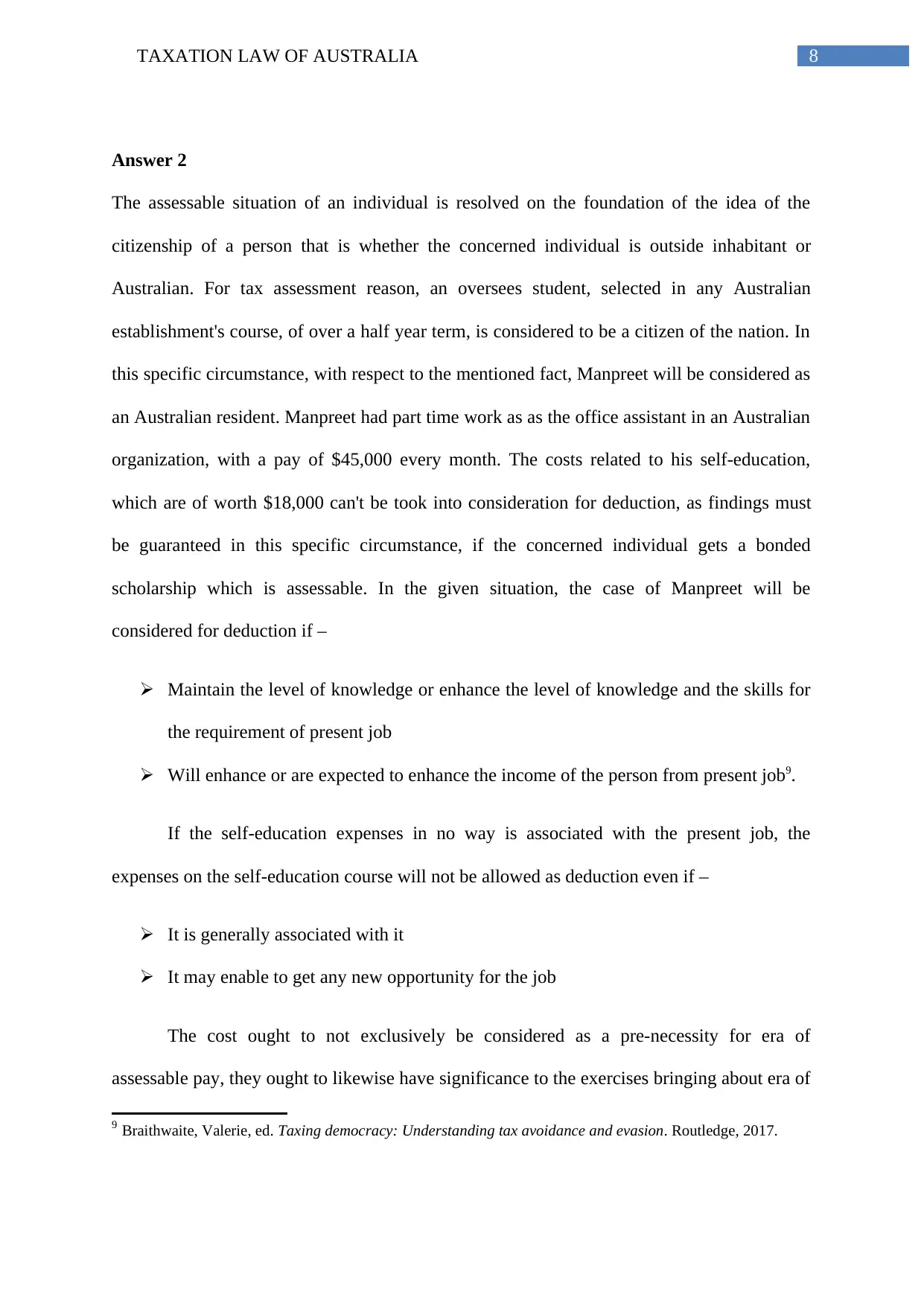
8TAXATION LAW OF AUSTRALIA
Answer 2
The assessable situation of an individual is resolved on the foundation of the idea of the
citizenship of a person that is whether the concerned individual is outside inhabitant or
Australian. For tax assessment reason, an oversees student, selected in any Australian
establishment's course, of over a half year term, is considered to be a citizen of the nation. In
this specific circumstance, with respect to the mentioned fact, Manpreet will be considered as
an Australian resident. Manpreet had part time work as as the office assistant in an Australian
organization, with a pay of $45,000 every month. The costs related to his self-education,
which are of worth $18,000 can't be took into consideration for deduction, as findings must
be guaranteed in this specific circumstance, if the concerned individual gets a bonded
scholarship which is assessable. In the given situation, the case of Manpreet will be
considered for deduction if –
Maintain the level of knowledge or enhance the level of knowledge and the skills for
the requirement of present job
Will enhance or are expected to enhance the income of the person from present job9.
If the self-education expenses in no way is associated with the present job, the
expenses on the self-education course will not be allowed as deduction even if –
It is generally associated with it
It may enable to get any new opportunity for the job
The cost ought to not exclusively be considered as a pre-necessity for era of
assessable pay, they ought to likewise have significance to the exercises bringing about era of
9 Braithwaite, Valerie, ed. Taxing democracy: Understanding tax avoidance and evasion. Routledge, 2017.
Answer 2
The assessable situation of an individual is resolved on the foundation of the idea of the
citizenship of a person that is whether the concerned individual is outside inhabitant or
Australian. For tax assessment reason, an oversees student, selected in any Australian
establishment's course, of over a half year term, is considered to be a citizen of the nation. In
this specific circumstance, with respect to the mentioned fact, Manpreet will be considered as
an Australian resident. Manpreet had part time work as as the office assistant in an Australian
organization, with a pay of $45,000 every month. The costs related to his self-education,
which are of worth $18,000 can't be took into consideration for deduction, as findings must
be guaranteed in this specific circumstance, if the concerned individual gets a bonded
scholarship which is assessable. In the given situation, the case of Manpreet will be
considered for deduction if –
Maintain the level of knowledge or enhance the level of knowledge and the skills for
the requirement of present job
Will enhance or are expected to enhance the income of the person from present job9.
If the self-education expenses in no way is associated with the present job, the
expenses on the self-education course will not be allowed as deduction even if –
It is generally associated with it
It may enable to get any new opportunity for the job
The cost ought to not exclusively be considered as a pre-necessity for era of
assessable pay, they ought to likewise have significance to the exercises bringing about era of
9 Braithwaite, Valerie, ed. Taxing democracy: Understanding tax avoidance and evasion. Routledge, 2017.
⊘ This is a preview!⊘
Do you want full access?
Subscribe today to unlock all pages.

Trusted by 1+ million students worldwide
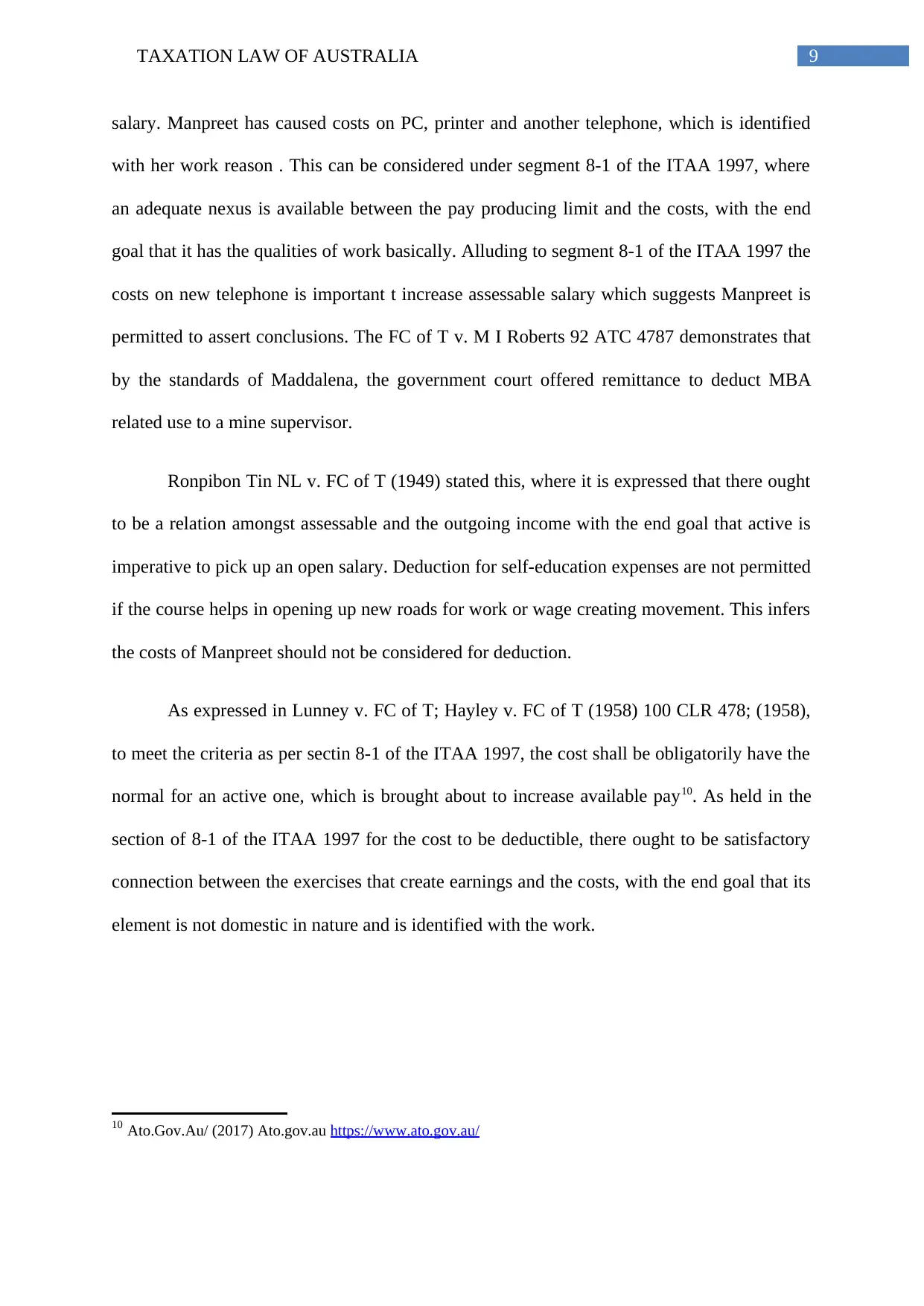
9TAXATION LAW OF AUSTRALIA
salary. Manpreet has caused costs on PC, printer and another telephone, which is identified
with her work reason . This can be considered under segment 8-1 of the ITAA 1997, where
an adequate nexus is available between the pay producing limit and the costs, with the end
goal that it has the qualities of work basically. Alluding to segment 8-1 of the ITAA 1997 the
costs on new telephone is important t increase assessable salary which suggests Manpreet is
permitted to assert conclusions. The FC of T v. M I Roberts 92 ATC 4787 demonstrates that
by the standards of Maddalena, the government court offered remittance to deduct MBA
related use to a mine supervisor.
Ronpibon Tin NL v. FC of T (1949) stated this, where it is expressed that there ought
to be a relation amongst assessable and the outgoing income with the end goal that active is
imperative to pick up an open salary. Deduction for self-education expenses are not permitted
if the course helps in opening up new roads for work or wage creating movement. This infers
the costs of Manpreet should not be considered for deduction.
As expressed in Lunney v. FC of T; Hayley v. FC of T (1958) 100 CLR 478; (1958),
to meet the criteria as per sectin 8-1 of the ITAA 1997, the cost shall be obligatorily have the
normal for an active one, which is brought about to increase available pay10. As held in the
section of 8-1 of the ITAA 1997 for the cost to be deductible, there ought to be satisfactory
connection between the exercises that create earnings and the costs, with the end goal that its
element is not domestic in nature and is identified with the work.
10 Ato.Gov.Au/ (2017) Ato.gov.au https://www.ato.gov.au/
salary. Manpreet has caused costs on PC, printer and another telephone, which is identified
with her work reason . This can be considered under segment 8-1 of the ITAA 1997, where
an adequate nexus is available between the pay producing limit and the costs, with the end
goal that it has the qualities of work basically. Alluding to segment 8-1 of the ITAA 1997 the
costs on new telephone is important t increase assessable salary which suggests Manpreet is
permitted to assert conclusions. The FC of T v. M I Roberts 92 ATC 4787 demonstrates that
by the standards of Maddalena, the government court offered remittance to deduct MBA
related use to a mine supervisor.
Ronpibon Tin NL v. FC of T (1949) stated this, where it is expressed that there ought
to be a relation amongst assessable and the outgoing income with the end goal that active is
imperative to pick up an open salary. Deduction for self-education expenses are not permitted
if the course helps in opening up new roads for work or wage creating movement. This infers
the costs of Manpreet should not be considered for deduction.
As expressed in Lunney v. FC of T; Hayley v. FC of T (1958) 100 CLR 478; (1958),
to meet the criteria as per sectin 8-1 of the ITAA 1997, the cost shall be obligatorily have the
normal for an active one, which is brought about to increase available pay10. As held in the
section of 8-1 of the ITAA 1997 for the cost to be deductible, there ought to be satisfactory
connection between the exercises that create earnings and the costs, with the end goal that its
element is not domestic in nature and is identified with the work.
10 Ato.Gov.Au/ (2017) Ato.gov.au https://www.ato.gov.au/
Paraphrase This Document
Need a fresh take? Get an instant paraphrase of this document with our AI Paraphraser
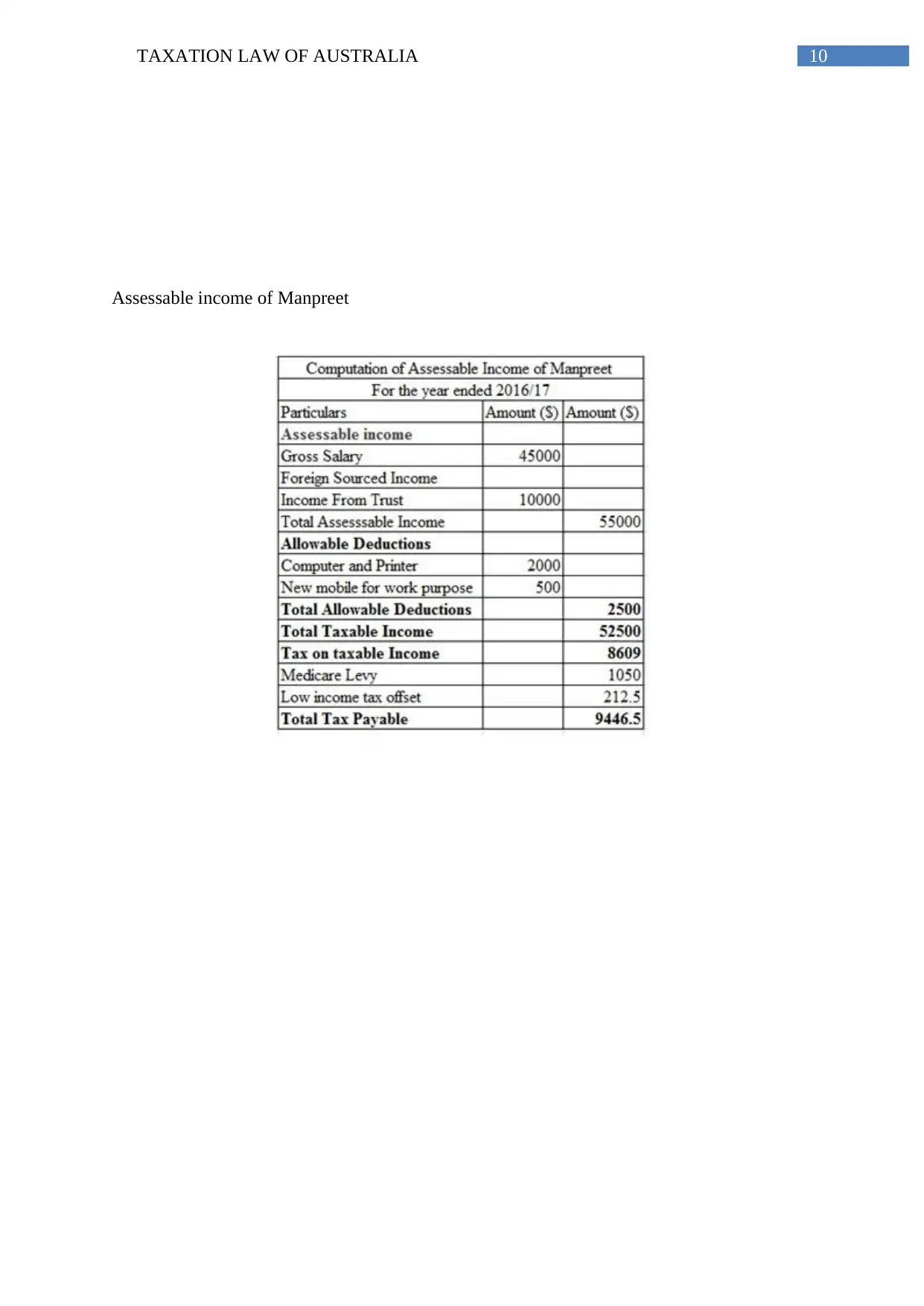
10TAXATION LAW OF AUSTRALIA
Assessable income of Manpreet
Assessable income of Manpreet
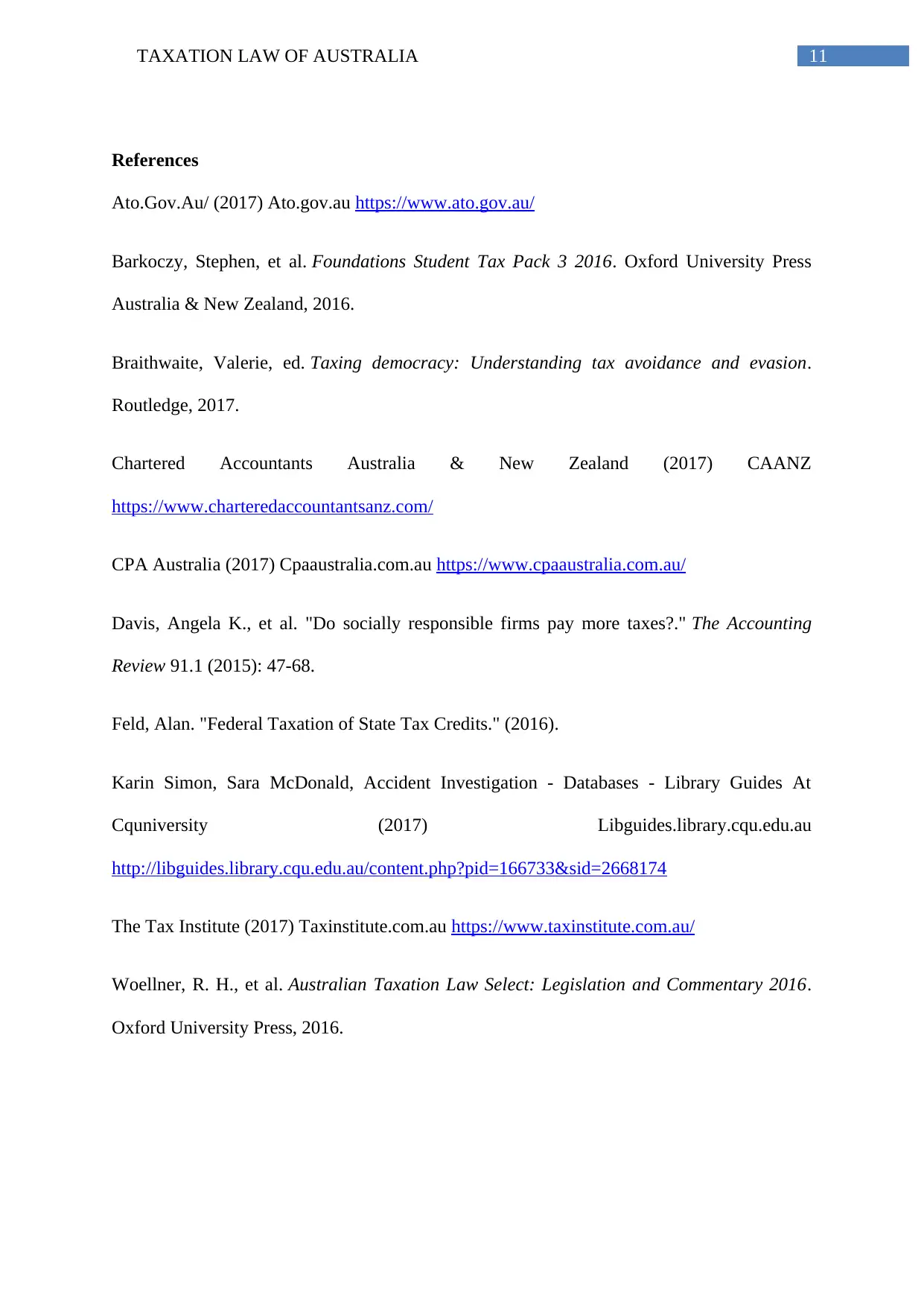
11TAXATION LAW OF AUSTRALIA
References
Ato.Gov.Au/ (2017) Ato.gov.au https://www.ato.gov.au/
Barkoczy, Stephen, et al. Foundations Student Tax Pack 3 2016. Oxford University Press
Australia & New Zealand, 2016.
Braithwaite, Valerie, ed. Taxing democracy: Understanding tax avoidance and evasion.
Routledge, 2017.
Chartered Accountants Australia & New Zealand (2017) CAANZ
https://www.charteredaccountantsanz.com/
CPA Australia (2017) Cpaaustralia.com.au https://www.cpaaustralia.com.au/
Davis, Angela K., et al. "Do socially responsible firms pay more taxes?." The Accounting
Review 91.1 (2015): 47-68.
Feld, Alan. "Federal Taxation of State Tax Credits." (2016).
Karin Simon, Sara McDonald, Accident Investigation - Databases - Library Guides At
Cquniversity (2017) Libguides.library.cqu.edu.au
http://libguides.library.cqu.edu.au/content.php?pid=166733&sid=2668174
The Tax Institute (2017) Taxinstitute.com.au https://www.taxinstitute.com.au/
Woellner, R. H., et al. Australian Taxation Law Select: Legislation and Commentary 2016.
Oxford University Press, 2016.
References
Ato.Gov.Au/ (2017) Ato.gov.au https://www.ato.gov.au/
Barkoczy, Stephen, et al. Foundations Student Tax Pack 3 2016. Oxford University Press
Australia & New Zealand, 2016.
Braithwaite, Valerie, ed. Taxing democracy: Understanding tax avoidance and evasion.
Routledge, 2017.
Chartered Accountants Australia & New Zealand (2017) CAANZ
https://www.charteredaccountantsanz.com/
CPA Australia (2017) Cpaaustralia.com.au https://www.cpaaustralia.com.au/
Davis, Angela K., et al. "Do socially responsible firms pay more taxes?." The Accounting
Review 91.1 (2015): 47-68.
Feld, Alan. "Federal Taxation of State Tax Credits." (2016).
Karin Simon, Sara McDonald, Accident Investigation - Databases - Library Guides At
Cquniversity (2017) Libguides.library.cqu.edu.au
http://libguides.library.cqu.edu.au/content.php?pid=166733&sid=2668174
The Tax Institute (2017) Taxinstitute.com.au https://www.taxinstitute.com.au/
Woellner, R. H., et al. Australian Taxation Law Select: Legislation and Commentary 2016.
Oxford University Press, 2016.
⊘ This is a preview!⊘
Do you want full access?
Subscribe today to unlock all pages.

Trusted by 1+ million students worldwide
1 out of 13
Related Documents
Your All-in-One AI-Powered Toolkit for Academic Success.
+13062052269
info@desklib.com
Available 24*7 on WhatsApp / Email
![[object Object]](/_next/static/media/star-bottom.7253800d.svg)
Unlock your academic potential
Copyright © 2020–2026 A2Z Services. All Rights Reserved. Developed and managed by ZUCOL.





